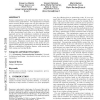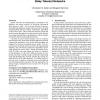96 search results - page 9 / 20 » An Adaptive Blind Algorithm for Energy Balanced Data Propaga... |
CORR
2008
Springer
13 years 7 months ago
2008
Springer
Energy consumption is the most important factor that determines sensor node lifetime. The optimization of wireless sensor network lifetime targets not only the reduction of energy...
ADHOCNOW
2010
Springer
13 years 9 months ago
2010
Springer
Random walks in wireless sensor networks can serve as fully local, very simple strategies for sink motion that reduce energy dissipation a lot but increase the latency of data coll...
SENSYS
2006
ACM
14 years 1 months ago
2006
ACM
Sensor networks are fundamentally constrained by the difficulty and energy expense of delivering information from sensors to sink. Our work has focused on garnering additional si...
INFOCOM
2011
IEEE
12 years 11 months ago
2011
IEEE
—For energy conservation, a wireless sensor network is usually designed to work in a low-duty-cycle mode, in which a sensor node keeps active for a small percentage of time durin...
MOBIHOC
2008
ACM
14 years 7 months ago
2008
ACM
Due to the long propagation delay and high error rate of acoustic channels, it is very challenging to provide reliable data transfer for time-critical applications in an energy-ef...


